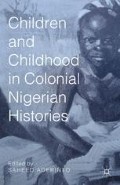Abstract
That the history of children is still yet to emerge into a viable sub-field of Nigerian history in the second decade of the twenty-first century attests to the limited scholarly attention given to this aspect of Africa’s demography and past.1 The study of the history of children is significant to the understanding of every aspect and era of African history. If historians have convincingly proved that Africa’s past is incomplete without the history of women, so also is it lacking without children’s history. In broader terms, the history of children is generally submerged in the larger history of state and empire formation, colonialism, modernity, and sociopolitical transformation. Children und Childhood in Colonial Nigerian Histories examines the central historical role of minors. It seeks to answer these interrelated questions, among others: What place did children occupy in colonial Nigeria’s past, and how has their role changed over time? Who was a child in colonial Nigeria? What is the value of using age as a category of historical analysis? What is the intersection between childhood and modernity? We invite readers to join in reflecting on the idea of modern Nigerian childhood and how it emerged. The goal of this book is to place our received notions of an ideal or modern childhood—namely, school enrollment instead of work; child rights and legal protections; juvenile delinquency as a problem of nation building; and children as belonging to ethnic, national, and global spheres—into proper historical context.
Access this chapter
Tax calculation will be finalised at checkout
Purchases are for personal use only
Preview
Unable to display preview. Download preview PDF.
Notes
The following list of works on children and juvenile history in Africa is not exhaustive: Beverly Carolease Grier, Invisible Hands: Child Labor and the State in Colonial Zimbabwe (Portsmouth, NH: Heinemann, 2006);
Abosede George, “Within Salvation: Girl Hawkers and the Colonial State in Development Era Lagos,” Journal of Social History 44, no.3 (2011): 837–59;
Owen White, Children of the French Empire: Miscegenation and Colonial Society in French West Africa, 1885–1960 (Oxford: Oxford University Press, 1999);
Laurent Fourchard, “Lagos and the Invention of Juvenile Delinquency in Nigeria,” Journal of African History 47, no. 1 (2006): 115–37;
Simon Heap, “‘Jaguda boys’: Pickpocketing in Ibadan, 1930–1960,” Urban History 24, no.3 (1997): 324–43;
Simon Heap, “‘Their Days Are Spent in Gambling and Loafing, Pimping for Prostitutes, and Picking Pockets’: Male Juvenile Delinquents on Lagos Island, 1920s–60s,” Journal of Family History 35, no.1 (2010): 48–70; Saheed Aderinto, “‘O! Sir I Do Not Know Either to Kill Myself or to Stay’: Childhood Emotion, Poverty, and Literary Culture in Nigeria, 1900–1960,” Journal of the History of Childhood and Youth 8, no.2 (forthcoming, 2015);
Abosede George, Making Modern Girls: A History of Girlhood, Labor, and Social Development in Colonial Lagos (Athens, Ohio: Ohio University Press 2014);
Raphael Chijioke Njoku, African Cultural Values: Igbo Political Leadership in Colonial Nigeria, 1900–1966 (New York: Routledge, 2006);
S.E. Duff, “‘Capture the Children’: Writing Children into the South African War, 1899–1902,” Journal of the History of Chilhood and Youth 7, no.3 (2014): 355–76.
Nathaniel A. Fadipe, The Sociology of the Yoruba (Ibadan: Ibadan University Press, 1970), 100–105;
Percy Amaury Talbot, The Peoples of Southern Nigeria (London: Frank Cass, 1969 [1923]), 2: 388–415;
Percy Amaury Talbot, The Peoples of Southern Nigeria (London: Frank Cass, 1969 [1923]), 3: 538–61; and
Percy Amaury Talbot, Life in Southern Nigeria: The Magic, Belief, and Customs of the Ibibio Tribe (New York: Barnes and Noble, 1967 [1923]), 26–9, 38–9, 126–27;
G. T. Basden, Among the Ibos of Nigeria (New York: Barnes and Noble, 1921), 57–67.
Philippe Aries, Centuries of Childhood: A Social History of Family Life, translated from the French by Robert Baldick (New York: Vintage Books, 1962).
For reviews of Centuries of Childhood, see, among others, Colin Heywood, A History of Childhood: Children and Childhood in the West from Medieval to Modern Times (Cambridge: Polity Press, 2001), 1–10;
Paula S. Fass, “Is There a Story in the History of Childhood?” in Paula S. Fass, ed., The Routledge History of Childhood in the Western World, 1–14 (New York: Routledge, 2013); and
Hugh Cunningham, Children and Childhood in Western Society since 1500 (London: Longman, 1995), 1–18.
Olufemi Taiwo, How Colonialism Preempted Modernity in Africa (Indianapolis: Indiana University Press, 2010).
A. Babs Fafunwa, History of Education in Nigeria (Ibadan: NPS Educational Publishers, 1974), 82.
J. F. Ade Ajayi, Christian Missions in Nigeria, 1841–1891: The Making of a New Elite (Evanston, IL: Northwestern University Press, 1969), 133.
J. S. Coleman, Nigeria: A Background to Nationalism (Berkeley: University of California Press, 1958), 134.
Sara Berry, Fathers Work for Their Sons: Accumulation, Mobility, and Class Formation in an Extented Yoruba Community (Berkeley: University of California Press, 1985).
J. B. Webster, The African Churches among the Yoruba, 1888–1922 (Oxford: Clarendon, 1964);
E. A. Ayandele, Holy Johnson: Pioneer of African Nationalism, 1836–1917 (London: Frank Cass, 1970).
Editor information
Editors and Affiliations
Copyright information
© 2015 Saheed Aderinto
About this chapter
Cite this chapter
Aderinto, S. (2015). Introduction. In: Aderinto, S. (eds) Children and Childhood in Colonial Nigerian Histories. Palgrave Macmillan, New York. https://doi.org/10.1057/9781137492937_1
Download citation
DOI: https://doi.org/10.1057/9781137492937_1
Publisher Name: Palgrave Macmillan, New York
Print ISBN: 978-1-349-50559-3
Online ISBN: 978-1-137-49293-7
eBook Packages: Palgrave History CollectionHistory (R0)

